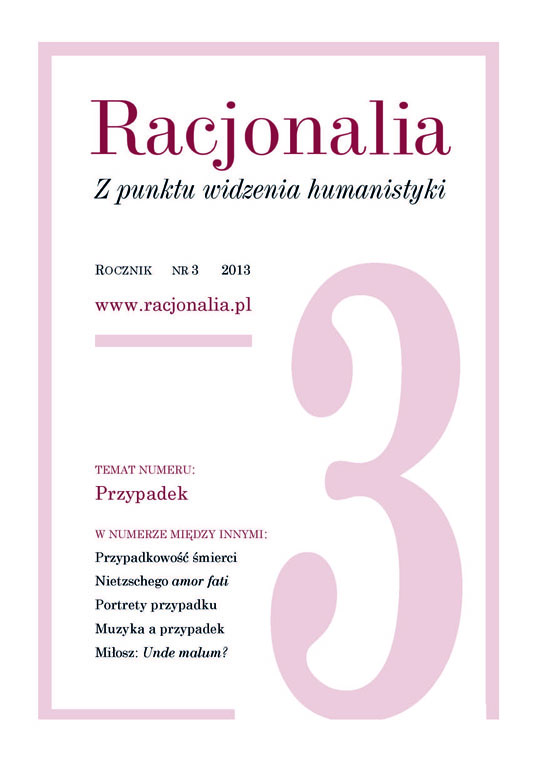Amor fati Fryderyka Nietzschego (konieczność i przypadkowość losu człowieka)
DOI:
https://doi.org/10.15633/r.265Słowa kluczowe:
amor fati, necessity, fortuitousness, Übermensch, Nietzsche F.Abstrakt
This article is about the concept of amor fati in the Friedrich Nietzsche’s philosophy. In philosophy of Beyond Good and Evil the author’s idea of amor fati combines reflections on fortuitousness and necessity in the context of human life. In this paper, the author attempts to show the significance of this idea by the interpretation of Nietzsche’s statements about the following concepts: fortuitousness and necessity. The other issue is Nietzsche’s writing about his own attitude to life and the world. The amor fati idea appear to be an existential challenge that Nietzsche confronts with people who want to see their life as meaningful. By Nietzsche fortuitousness as the essence of the world is subordinate to the human life requiring the purpose. The amor fati concept appears as one way of life in the world without purpose.Pobrania
Opublikowane
2013-11-30
Numer
Dział
Artykuły
Licencja
Twórca oświadcza, że służą mu prawa autorskie do utworu i że nie są ograniczone w zakresie objętym niniejszym oświadczeniem oraz że utwór jest dziełem oryginalnym i nie narusza praw autorskich innych osób.
Twórca zezwala Uniwersytetowi Papieskiemu Jana Pawła II w Krakowie na nieodpłatne, niewyłączne i nieograniczone w czasie korzystanie z utworu, to jest:
- utrwalanie i zwielokrotnianie: wytwarzanie egzemplarzy utworu techniką drukarską, reprograficzną, zapisu magnetycznego oraz techniką cyfrową;
- obrotu oryginałem albo egzemplarzami, na których utwór utrwalono (wprowadzanie do obrotu, użyczenie lub najem oryginału albo egzemplarzy, publiczne wystawienie, wyświetlenie, a także publiczne udostępnianie utworu w taki sposób, aby każdy mógł mieć do niego dostęp w miejscu i w czasie przez siebie wybranym);
- włączenie utworu w skład utworu zbiorowego;
- udzielanie przez Uniwersytet Papieski Jana Pawła II w Krakowie sublicencji Creative Commons Uznanie autorstwa-Użycie niekomercyjne-Bez utworów zależnych 3.0 Polska
Uniwersytet Papieski Jana Pawła II w Krakowie udostępnia utwór na Platformie Czasopism należącej do uczelni, na licencji Creative Commons Uznanie autorstwa-Użycie niekomercyjne-Bez utworów zależnych 3.0 Polska. Tym samym uprawnia wszystkich zainteresowanych do korzystania z utworu pod następującymi warunkami:
- zostanie podany autor i tytuł utworu,
- zostanie podane miejsce publikacji (tytuł czasopisma i adres internetowy do oryginalnie opublikowanego utworu),
- utwór będzie dystrybuowany w sposób niekomercyjny,
- nie będą tworzone utwory zależne.

